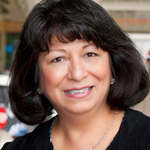“I think that we as a country need to care about all of our children, not only our own children.”
Interview with Celia Ayala
Chief Executive Officer, Los Angeles Universal Preschool (LAUP)
by Senior Policy Advisor Steven Hicks
Celia Ayala oversees LAUP‘s long-term strategy and day-to-day operations, with the goal of increasing access to quality and affordable preschool for children across Los Angeles County. Under Dr. Ayala’s leadership, LAUP is successfully funding the enrollment of more than 10,000 children into quality preschool each year. Recently, LAUP created “Take Time. Talk!” as a Clinton Global Initiative (CGI) America commitment.
Steven: Can you talk a little bit about how you began your career in early learning?
Celia: I grew up with lots of children around me, but I think I can recall making a difference when I was a teacher assistant at 32nd Street Elementary. I was assisting in first and second grade classrooms, and I saw how one student did not know his ABCs. He was so limited in his language skills. His social skills were not well developed either. I remember spending so much time working with him, and just getting him to speak and getting him to ultimately feel comfortable with who he was. I didn’t realize that I could make a difference in a child’s life. But it was really in my second time of being a principal and having three big preschool classrooms that were for 3 and 4 year olds. I had children that had been in preschool and children that had not. I realized kindergarten is not where education starts, and I had been a kindergarten teacher in the 70s. And here I was in the late 90s, and realized that we need to do more in early education and working with parents – parents being the first and most important teachers. We can do so much more in kinder readiness. We needed to work with our 3 and 4 years-olds to get them socially, emotionally and cognitively ready for kindergarten.
Steven: What do see as the role of LAUP and local communities in improving the quality of early learning?
Celia: I see LAUP as a great brainstorm of a child that created something first and foremost about quality and all the support systems with no excuses. So it wasn’t an issue of if we could afford it, it wasn’t an issue of can we do it, and it wasn’t an issue of who could do it. It was building in quality criteria without any limitations. LAUP wanted to be a part of helping each child, east to west and in between, in communities with a mixed-model delivery system and to think about what is the best model without excuses or without limitations. And I believe that LAUP has become a very replicable model, truly addressing the local needs of every community in every part of Los Angeles County. We address the local needs of every community with a quality rating improvement system that is applicable to all of its mixed-model delivery partners. It is not LAUP and then the community. We are part of every community, providing quality programs.
Steven: Can you tell me why the President’s proposal to provide high-quality early learning and development programs for children is important for our country, and what do you see as some of the challenges and opportunities?
Celia: I think the President is smart because he wants to provide equity. By providing high-quality early learning opportunities, it is truly giving children a chance to enter the K-12 world on an even playing field. And it is about involving families and caregivers – because some of our children don’t live with parents, but with grandparents or foster parents – to work with our children where every they might be – a center, school district, or a non-profit. He sees that the benefit in the short term is the child, but in the long term, it is our entire society by preparing the future workforce. The children entering kindergarten need to be ready to succeed in school and in life, but it is also the workforce that we need to focus on because they are preparing our future engineers, our future teachers, and our future plumbers. I truly believe he is seeing the short term and long term benefits of these early investments and interventions. I think the challenges are that people don’t get the importance. They are not seeing that we are spending dollars on remediation instead of intervention. They’re not seeing that it’s not only a short term investment for the children, but an investment in the long term for our country. The challenges are we cannot get a budget to support it. And then there is a challenge in terms of making sure that we see that in the long term it is going to take time to ramp up, to staff up, and to sustain over time – that this is a long term investment in local communities, in our states, and in the nation. Those are the challenges: we’re not identifying the resources to support this and we’re not seeing this as potentially a ten year ramp up and sustainable effort that will hopefully benefit our country socially, economically, and educationally.


